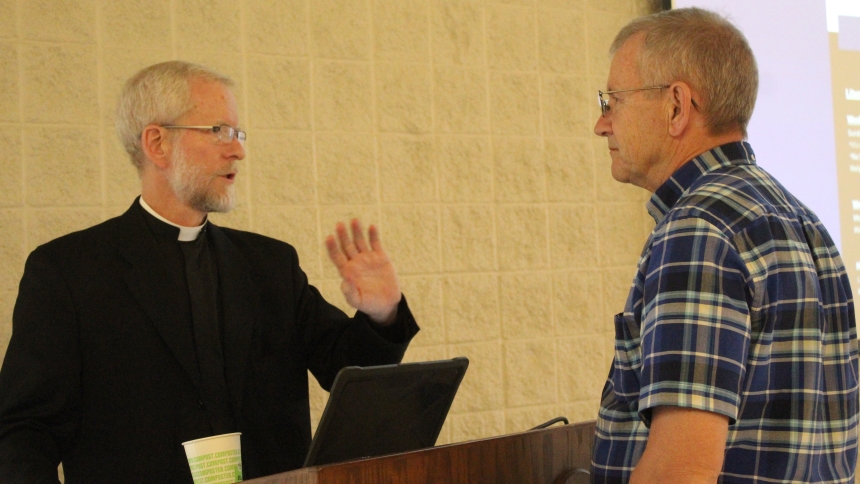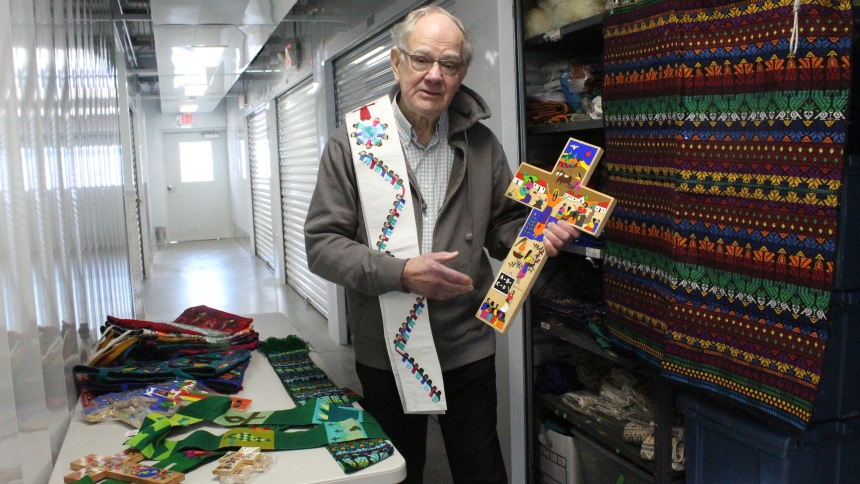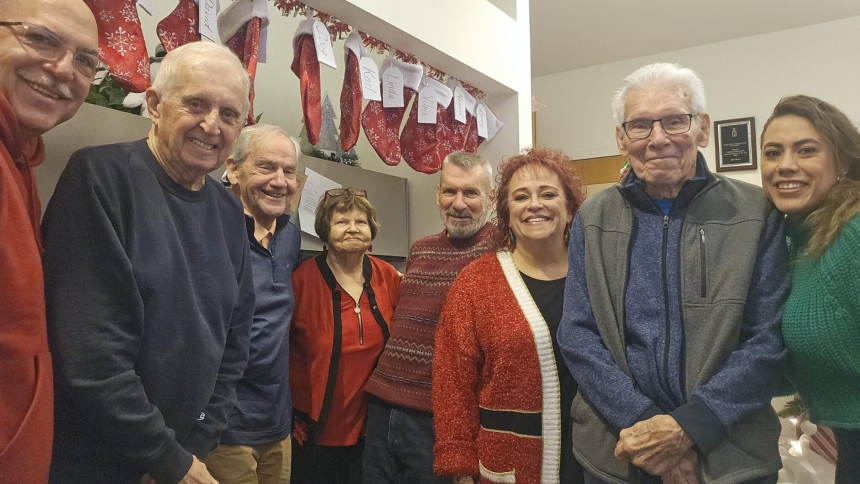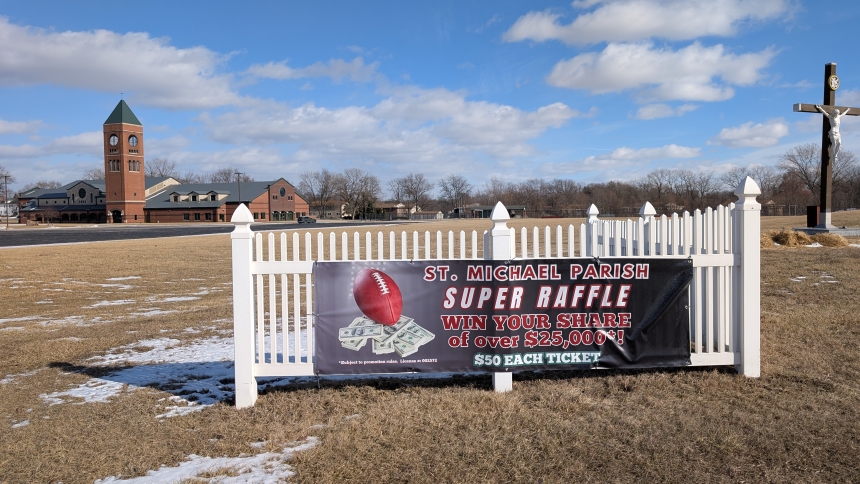
MERRILLVILLE – What are the teachings of the Catholic Church on in vitro fertilization and end-of-life medical technology?
Those were the issues directly addressed by Father Tad Pacholczyk, Ph.D., senior ethicist at the National Catholic Bioethics Center in Philadelphia, at a Nov. 8 presentation sponsored by the Diocese of Gary at Our Lady Queen of Martyrs South Campus.
In his two-part program, “Sacred Decisions on Life and Death,” the priest ordained in 1999 for the Diocese of Fall River, Mass., who earned his doctorate in neuroscience from Yale University and did postdoctoral work at Harvard University, stressed that IVF “is always wrong,” while families are under no obligation to choose “disproportionate” medical care for their loved ones.
“We know how hard it can be to see the truth of the Catholic Church’s teaching (on IVF),” he said of couples facing infertility issues. “It can cloud our vision and make us focus on only one goal – having a baby.”
While acknowledging the heartbreak, sadness and grief of couples who cannot conceive, “intensified by others – friends and family – who are having children,” Father Pacholczyk said couples must realize they “are not in control. The plan of God brings hope to infertile couples.”
Father Pacholczyk pointed out that while “advances in technology have created an array of tempting and new approaches” to infertility, and while advances in technology are generally good, “we cannot assume what is technologically possible is always right.”
“(Some people say), but God created science, so we should use it – but science also created the atomic bomb,” he added.
The ethicist admitted that “an explanation of why (IVF) is wrong is unlikely to reach couples facing infertility initially, the mind can accept when the heart is prepared by finding the language of understanding.”
Therefore, he said, family, friends and faith communities must show compassion and empathy with couples who are mourning their inability to have a child.
“This does not require us to have identical journeys, just the ability to put ourselves in the place of the suffering and realize how difficult the journey is,” said the priest. “We need to have patience with infertile couples and meet them where they are … before we try to bring them to where we think they need to be in terms of personal virtue.”
In vitro fertilization may be wrong, he added, other alternatives are okay to try, such as restorative reproductive medicine and natural family planning, treating a woman’s ovulation problems or a man’s low sperm count. “The key criteria is a distinction between replacing the marital act and assisting the marital act,” Father Pacholczyk said. He identified FEMM, a science-based program using an app to help women achieve hormonal balance and optimal reproductive health (femmhealth.org), as one option.
Rosanne Kouris, diocesan marriage and family life coordinator, identified herself as a natural family planning instructor who hosts regular classes for couples. She invited interested couples to set up an appointment by contacting her at 769-9292, ext. 88259 or rkouris@dcgary.org.
For couples “facing the hard case of irresolute infertility,” said Father Pacholczyk, adoption could be an alternative, as well as becoming a parish youth leader or reaching out to help children through other programs.
“Prayer can be important,” he noted. “What can it mean to share our maternal and paternal instincts in other ways?”
Father Pacholczyk said support groups, whether sponsored by a parish or diocese, can be helpful, as can the encouragement of “others who can witness to them. Couples can minister to each other.”
In the second part of his presentation, Father Pacholzyk addressed “The Gift of Dying Well” as it pertains to medical technology “that has extended life … but adds complexity to issues of death.”
Calling it “a gray area,” the ethicist posed the questions “What are we required to do? and What should we do?
“We have to discern, we need to do due diligence, get a doctor’s advice, talk to a priest,” he said, acknowledging widespread fears about technology and dying.
In deciding what medical treatment to approve for ourselves or a loved one, he added, Catholics need to weigh the “proportionate vs. the disproportionate.”
The two key criteria, Father Pacholczyk said, are weighing “benefits vs. burdens” of a particular treatment. “Is it the standard of care, or a clinical trial or experimental treatment? What are the treatment risks, side effects and burdens? Is the expense a significant burden, and will a burden be placed on other family members? What is the patient’s personal fortitude for the struggle?”
Those questions must be weighed against the benefits of the treatment, he said, whether it will extend and/or improve the quality of life.
Rather than an Advanced Directive that can detail what treatments a future patient may want, which Father Pacholczyk likened to “writing a blank check since you don’t know the hospital, the condition or the treatment options you might face,” he suggested choosing a health care proxy with a durable power of attorney to make decisions as needed.
Father Pacholczyk said the patient themselves can still make decisions if they are able, followed by their surrogate, with the Advanced Directive seen as “advisory.”
Father Pacholczyk said families should discuss their preferences in advance, and try to use their experiences with dying as an opportunity to grow closer.
“Dying involves a lot of people – the patient, family, clergy, physician and society. Anything we can do to better discern is helpful,” he said.
The National Catholic Bioethics Center offers Personal Ethics consultations and free ethics support 24/7 at (215) 877-2660.
Caption: During an intermission between his two presentations on Nov. 8, Catholic ethicist Father Tad Pacholczyk, Ph.D., talks with attendee Jeffery Wozniak, a member of Parishioners for Life at St. Patrick in Chesterton and sexton of the parish cemetery. “Sacred Decisions on Life and Death,” was sponsored by the Diocese of Gary at Our Lady Queen of Martyrs South Campus in Merrillville. (Marlene A. Zloza photo)



